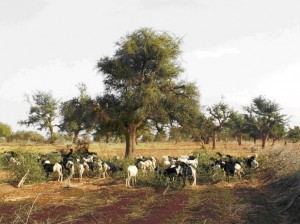Cross posted from Worldwatch Institute’s Nourishing the Planet.
 For centuries, farmers in the Sahel-a band of land that crosses Africa at the southern fringe of the Sahara Desert-used rotational tree farming to provide year-round harvests and a consistent source of food, fuel, and fertilizer. But severe droughts and rapid population growth in the 1970s and 80s significantly degraded the Sahel’s farmland, leading to the loss of many indigenous tree species and leaving the soil barren and eroded. With the loss of the trees went the knowledge, traditions, and practices that had kept the region fertile for hundreds of years.
For centuries, farmers in the Sahel-a band of land that crosses Africa at the southern fringe of the Sahara Desert-used rotational tree farming to provide year-round harvests and a consistent source of food, fuel, and fertilizer. But severe droughts and rapid population growth in the 1970s and 80s significantly degraded the Sahel’s farmland, leading to the loss of many indigenous tree species and leaving the soil barren and eroded. With the loss of the trees went the knowledge, traditions, and practices that had kept the region fertile for hundreds of years.
To save the land as well as local livelihoods, many traditional management practices are now being revived. One inexpensive method of farming that helps to restore the Sahel’s degraded land is so-called Farmer-Managed Natural Regeneration (FMNR) (see also Millions Fed: “Re-Greening the Sahel: Farmer-led Innovation in Burkina Faso and Niger”). By pruning shoots that periodically and naturally sprout from below-ground root webs, farmers can promote forest growth and take advantage of a naturally occurring source of fuel, food, or animal fodder.
The trees produce fruit rich in nutrients and help to restore the soil by releasing nitrogen and protecting the ground from erosion by wind and rain. The cultivated but naturally occurring forest also creates a local source of firewood and mulch, reducing the time spent in gathering fuel for cooking meals and cleaning households (see Reducing the Things They Carry). The practice also cuts down on deforestation as the trees that are used for fuel are replaced with seedlings and tended by farmers.
“Farmer-managed natural regeneration is a fairly simple technique, but it produces multiple benefits,” explained Chris Reij, a natural resources management specialist with the Center for International Cooperation (and advisor to the Nourishing the Planet Project), at an Oxfam-hosted panel on locally driven agriculture innovations in Washington, D.C., last October. “Sometimes planting trees make sense, but in terms of costs and long-time success, in many cases it makes more sense to use natural regeneration.”
As important as the technique itself is, even more important is making sure that farmers in the Sahel know about it. When farmers learn how they can benefit from the practice, they are quick to adopt it, improving their own livelihoods and food security while regenerating local forests. Reij attributes the overwhelming success of FMNR in Niger-where many villages have 10-20 times more trees than 20 years ago-to the reduced central-government presence in rural areas. With the government distracted by political conflict, forest management now belongs almost completely to the local farmers who benefit from FMNR the most. (See also Aid Groups, Farmers Collaborate to Re-Green Sahel.)
To ensure that even more farmers know about FMNR and its benefits, the Web Alliance for the Re-Greening in Africa (W4RA), a joint project between African Re-Greening Initiatives (ARI), the Web Foundation, and VU Amsterdam, is helping to create web-based information exchanges between farmers. Meanwhile, the organization SahelEco has initiated two projects, Trees Outside the Forest and the Re-Greening the Sahel Initiative, to encourage policymakers, farmers’ organizations, and government leaders throughout the region to provide the support and legislation needed to put the responsibility of managing trees on agricultural land into the hands of farmers.
To read more about agroforestry and other ways that agriculture can restore degraded land, see: An Evergreen Revolution? Using Trees to Nourish the Planet, It’s About More Than Trees at the World Agroforestry Centre, Trees as Crops in Africa, and Mitigating Climate Change Through Food and Land Use.
Thank you for reading! If you enjoy our diary every day we invite you to get involved:
1. Comment on our daily posts-we check comments everyday and look forward to a regular ongoing discussion with you.
2. Receive weekly updates-Sign up for our “Nourishing the Planet” weekly newsletter at the blog by clicking here and receive regular blog and travel updates.